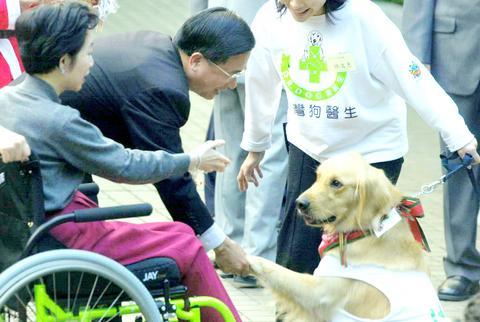Next year's presidential election will be Chen Shui-bian's (
"I am quite happy about next year's election. The first reason is that we just had a new member of the family, small An-an [her grandson Chao Yi-an (

PHOTO: CHIANG YING-YING, TAIPEI TIMES
"The second reason is that in next year's election, no matter the outcome, it will be Chen Shui-bian's last battle. After that I don't have to campaign for him anymore," she said.
"He will be campaigning for me in the future instead," Wu, who was once a legislator, joked.
Wu made the statement during a tea party at the president's residence yesterday. The president and the first lady threw the party for physically and mentally handicapped children, Vincent Kabore from Burkina Faso and Huynh Thi Van from Vietnam who came to Taiwan for medical treatment, and "doctor dogs," which are trained to help people with various therapies.
The dogs were the stars at the party. Chen and Wu played with the dogs and Chen addressed the issue of China and Taiwan again by telling a story of his dogs, Yung-ko (
"When I look at the doctor dogs, I think of my own Yung-ko and Honey. There was one day when Yung-ko and Honey got into a fight, and I asked them what happened," Chen said.
"Yung-ko said that Honey tried to provoke him, and I thought, how would 2kg Honey have wanted to provoke 30kg Yung-ko? Then Honey told me that Yung-ko aimed his slingshot at her, and she just shouted, `don't hurt me,' and Yung-ko said it was provocation."
Wu also recounted the story of their golden retriever, Freedom. She said that when they had Freedom, they gave it the best care they could, but it died after eight months because of kidney problems.
"But my daughter saw a dog on the street one day, and it was led by a poor old man collecting garbage. It was rainy and cold, and that dog was only covered by plastic. Yet that dog seemed to survive well," Wu said.
"Sometimes people are like that. They live better when they are in an harsh environment," she said.

The first global hotel Keys Selection by the Michelin Guide includes four hotels in Taiwan, Michelin announced yesterday. All four received the “Michelin One Key,” indicating guests are to experience a “very special stay” at any of the locations as the establishments are “a true gem with personality. Service always goes the extra mile, and the hotel provides much more than others in its price range.” Of the four hotels, three are located in Taipei and one in Taichung. In Taipei, the One Key accolades were awarded to the Capella Taipei, Kimpton Da An Taipei and Mandarin Oriental Taipei. Capella Taipei was described by

The Taichung District Court yesterday confirmed its final ruling that the marriage between teenage heir Lai (賴) and a man surnamed Hsia (夏) was legally invalid, preventing Hsia from inheriting Lai’s NT$500 million (US$16.37 million) estate. The court confirmed that Hsia chose not to appeal the civil judgement after the court handed down its ruling in June, making the decision final. In the June ruling, the court said that Lai, 18, and Hsia, 26, showed “no mutual admiration before the marriage” and that their interactions were “distant and unfamiliar.” The judge concluded that the couple lacked the “true intention of

EVA Airways today confirmed the death of a flight attendant on Saturday upon their return to Taiwan and said an internal investigation has been launched, as criticism mounted over a social media post accusing the airline of failing to offer sufficient employee protections. According to the post, the flight attendant complained of feeling sick on board a flight, but was unable to take sick leave or access medical care. The crew member allegedly did not receive assistance from the chief purser, who failed to heed their requests for medical attention or call an ambulance once the flight landed, the post said. As sick

INDUSTRY: Beijing’s latest export measures go beyond targeting the US and would likely affect any country that uses Chinese rare earths or related tech, an academic said Taiwanese industries could face significant disruption from China’s newly tightened export controls on rare earth elements, as much of Taiwan’s supply indirectly depends on Chinese materials processed in Japan, a local expert said yesterday. Kristy Hsu (徐遵慈), director of the Taiwan ASEAN Studies Center at the Chung-Hua Institution for Economic Research, said that China’s latest export measures go far beyond targeting the US and would likely affect any country that uses Chinese rare earths or related technologies. With Japan and Southeast Asian countries among those expected to be hit, Taiwan could feel the impact through its reliance on Japanese-made semi-finished products and